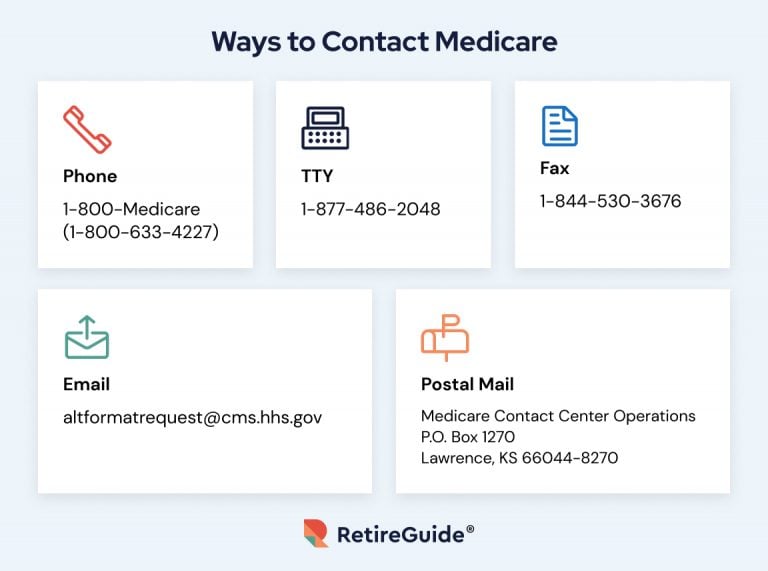Medicare Customer Service and Support
There are several ways to contact Medicare if you have a question or concern about your health coverage. The easiest way may be to call Medicare at 1-800-633-4227 (TTY at 1-877-486-2048). However, you can also use your MyMedicare.gov account to send an email or a letter by mail.

- Written by Terry Turner
Terry Turner
Senior Financial Writer and Financial Wellness Facilitator
Terry Turner has more than 35 years of journalism experience, including covering benefits, spending and congressional action on federal programs such as Social Security and Medicare. He is a Certified Financial Wellness Facilitator through the National Wellness Institute and the Foundation for Financial Wellness and a member of the Association for Financial Counseling & Planning Education (AFCPE®).
Read More- Edited By
Matt Mauney
Matt Mauney
Financial Editor
Matt Mauney is an award-winning journalist, editor, writer and content strategist with more than 15 years of professional experience working for nationally recognized newspapers and digital brands. He has contributed content for ChicagoTribune.com, LATimes.com, The Hill and the American Cancer Society, and he was part of the Orlando Sentinel digital staff that was named a Pulitzer Prize finalist in 2017.
Read More- Reviewed By
Alex Ponce
Alex Ponce
Licensed Agent at Insuractive
Alex Ponce is a licensed agent at Insuractive with over 10 years of industry experience. He specializes in Medicare insurance and is licensed to sell in all 50 states.
Read More- Published: August 6, 2020
- Updated: March 26, 2025
- 6 min read time
- This page features 3 Cited Research Articles
Key Takeaways- Medicare does not operate local offices, but you can contact a Medicare customer service representative over the phone or through the Medicare website.
- The easiest way to contact Medicare customer service and support is by phone, toll-free at 1-800-633-4227.
- You can also set up an account at MyMedicare.gov.
- You should only contact Medicare customer support if you are enrolled in Original Medicare.
- For questions about a Medicare Advantage plan, Medigap or Medicare Part D drug plans, contact the company that administers your plan.
When Should You Contact Medicare?
You should contact Medicare when you have questions or concerns about your Original Medicare coverage. If you have issues with a Medicare Advantage, Medigap or Medicare Part D prescription drug plan, you should contact the company that administers your plan.
Medicare customer service can help you with the following issues:- Billing
- Claims
- Coverage
- Emergency room care
- Expenses
- Forms
- Information about your Part D deductible
- Inpatient or outpatient hospital visit
- Medical records
- Medical supplies and equipment (oxygen, wheelchairs, etc.)
- Nursing home or hospice care
- Outpatient doctor care
- Phone numbers for Medicaid in your state
- Prescription drug coverage
- Preventive services available to you
Have you selected your 2025 Medicare plan?Maximize your Medicare savings by connecting with a licensed insurance agent.How to Call Medicare
You can call Medicare any time, 24 hours a day, seven days a week (including holidays) at 1-800-MEDICARE (1-800-633-4227). TTY users can call 1-877-486-2048.
This is the main number for general information about Medicare. Customer service representatives can help with basic questions. But there are other numbers at Medicare or other federal and state agencies that can help with more specific questions or issues.
Did You Know?You can bypass Medicare’s automated switchboard when you call by saying, “Agent,” at any time. This will turn off the directory menu and connect you with a human voice.Source: U.S. Centers for Medicare & Medicaid ServicesOther Helpful Numbers- Changing Your Address
- 1-800-772-1213: If you change the address linked to your Medicare account, you should notify the Social Security Administration.
- Report a Lost or Stolen Medicare Card
- 1-800-772-1213: You should notify the Social Security Administration immediately if your Medicare card has been lost or your ID number has been stolen.
- Department of Veterans Affairs
- 1-800-772-1213: If you are a veteran, the VA can provide information about how Medicare can work with your VA benefits.
- State Health Insurance Assistance Program
- 1-800-701-0501: The SHIP program in your state provides counseling services to help you choose the right Medicare plan and health insurance tailored to your needs and finances. The national hotline can set you up with the program in your state.
You can also use Medicare’s Helpful Contacts locator to look up contact information for dozens of state and federal agencies along with other organizations in your state.
What You Need to Have Ready Before Calling Medicare
Before calling Medicare, you’ll need to have several pieces of information readily available. This will help the customer service representative identify you and quickly address your questions or concerns.
What to Have Ready When Calling Medicare- Your red, white and blue Medicare card.
- A pen or pencil and paper to take notes.
- The amount you have already paid, if you are calling about a claim.
- The date you got a medical service or medical supplies, if you’re calling about a claim.
- The type of service or supplies you received, if you’re calling about a claim.
- Your doctor’s or other provider’s name, if you’re calling about a claim.
- Your Medicare Summary Notice, if you’re calling about a claim and the MSN is available.
You may also want to have a friend or family member listen in to the call on speakerphone. They should stay quiet but take notes for you so you can concentrate on the conversation with your customer service representative.
Also remember that you can request the information from Medicare in writing. Just ask for it at the end of your call.
Can Someone Call Medicare for You?
You can have someone else call Medicare for you, but you will have to take some steps first. Medicare will not give out your private medical information to anyone who calls unless you first give Medicare permission to do so.
You will either have to speak to the customer service representative on the phone and confirm that he or she can speak to someone else on your behalf.
Or you can send an authorization form before the call.
How to Fill Out a Medicare Disclosure Authorization FormIf you mail in your authorization, it may take a few weeks before permission is granted.
You have the ability to choose how long this authorization will stay in effect. It can be as short as the one call or as long as a lifetime permission. This is helpful when you are caring for an elderly parent or a sick dependent and/or spouse.
3 Minute Quiz: Can You Retire Comfortably?Take our free quiz & match with a financial advisor in 3 easy steps. Tailored to your goals. Near you or online.Contacts for Medicare Advantage, Medigap and Part D Plans
The Medicare customer service helpline may not have all the answers for Medicare Advantage, Medigap or Part D prescription drug plans. These plans are sold by private insurance companies under contract with Medicare.
You should look for contact information about your plan’s provider on the card you received from the insurer. Or you may need to look at the information you received about the plan when you first enrolled.
Other Ways to Contact Medicare
There are several ways to contact Medicare and receive information in a way you can understand and in an accessible form.
When you make a request, be sure to include your name, phone number, type of information you need and the mailing address where you want Medicare to send you the information.
 Expand
ExpandYou can also access all of Medicare’s print publications at the agency’s website. These may be a quick way for you to find the information you’re looking for.
Medicare Customer Service and Support FAQs
What are the main directory prompts when calling Medicare?After calling Medicare Customer Service at 1-800-633-4227, you can find the answer to many common questions by using number or voice prompts.- For claim status, press 1 or say “claims.”
- For questions or to pay premiums, press 2 or say “premium payments.”
- For questions about preventive exams, press 3 or say “preventive exams.”
- For questions about deductibles, press 4 or say “deductibles.”
- For coverage and benefits questions, press 5 or say “coverage and benefits.”
- For everything else, press 6 or say “something else” or “agent.”
When should you call Medicare?You can call Medicare to find out if services are covered, for information about prescription drug plans available where you live, to find Medicare doctors and other health care providers where you live and for other questions pertaining to Original Medicare.Who is the best person to talk to about Medicare?Medicare.gov, the “Medicare & You Handbook” and 1-800-MEDICARE are the best sources for unbiased information from Medicare. Your local State Health Insurance Assistance Program (SHIP) also offers free, unbiased counseling on Medicare issues.Editor Sierra Campbell contributed to this article.
Last Modified: March 26, 2025Share This Page3 Cited Research Articles
- U.S. Centers for Medicare & Medicaid Services. (2024, October 3). Contact CMS. Retrieved from https://www.cms.gov/About-CMS/Agency-Information/ContactCMS
- U.S. Centers for Medicare & Medicaid Services. (2019, September 25). Get Medicare Information In an Accessible Format. Retrieved from https://web.archive.org/web/20220525152955/https://www.medicare.gov/blog/get-medicare-information-in-an-accessible-format
- U.S. Centers for Medicare & Medicaid Services. (n.d.). Contact Medicare. Retrieved from https://www.medicare.gov/forms-help-other-resources/contact-medicare
- Edited By
Calling this number connects you to one of our trusted partners.
If you're interested in help navigating your options, a representative will provide you with a free, no-obligation consultation.
Our partners are committed to excellent customer service. They can match you with a qualified professional for your unique objectives.
We/Our Partners do not offer every plan available in your area. Any information provided is limited to those plans offered in your area. Please contact Medicare.gov or 1-800-MEDICARE to get information on all of your options.
888-694-0290Your web browser is no longer supported by Microsoft. Update your browser for more security, speed and compatibility.
If you need help pricing and building your medicare plan, call us at 844-572-0696


